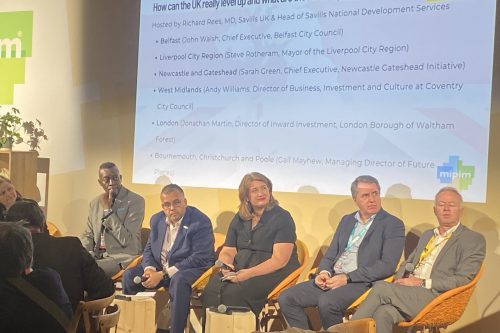Mixed picture of devolution creates frustrations for city leaders

The impact of levelling-up and its key policy of greater devolution has not yet demonstrated a significant impact on economic growth in the regions, according to a panel of UK city leaders.
Steve Rotheram, who has been Liverpool city region metro-mayor since 2017, told an audience at MIPIM: “We have done some things in the Liverpool city region that I think demonstrates that devolution works and and should be rolled out across the whole of the UK.
“The nations have it, some regions have it, but that means that other regions that don’t have it are being left even further behind.
“You need to do something about that – just because we’ve got it, I’m not pulling up the drawbridge. I think it’s right that others who want to have more autonomy should do so.
“But the fact of the matter is that we have the most centralised political democracy in the OECD, and the most unbalanced economy in the whole of Europe. For me, those two things are intrinsically entwined.”
John Walsh, chief executive of Belfast City Council, was asked how levelling-up had been working for his city.
“It hasn’t,” he said. “Belfast is really at that point of taking off. Our success in the tech sector, our success in cyber and fintech, has seen significant growth.
“With that growth has also come a demand for people and, unfortunately, it’s difficult to service the needs of those growing companies.
“When I look at levelling up and how it’s been deployed, I have to say that it’s not levelling-up. For me, it has not strategically achieved anything. Northern Ireland as a whole has not benefited from levelling-up to the same extent as other regions within the UK.”
Andy Williams, director of business, investment and culture at Coventry City Council, said: “A vibrant West Midlands is good for the UK, not just for the West Midlands, and the same in other parts of the UK too.
“There have been some great things in terms of transport connectivity, but more needs to be done in that space. More investment needs to happen to create those conditions for growth.
“I’ve got great examples where we’ve invested and used things like City of Culture to invest in infrastructure and public realm and transport connectivity that has brought investment. But that is a one off, and we now need to find ways to sustainably do those things across the Midlands.
“I think the jury is still out on levelling-up.”
Sarah Green, chief executive of the NewcastleGateshead Initiative, said: “Levelling up is not something that’s done to us. No, it’s something we want to do. We need a strong London in order to support the regions but equally London needs strong regions if we’re all going to succeed.
“In the North East we’re really excited about our devolution deal and we just need to go harder and faster on devolution. And it has to be real devolution. It’s not about economic engineering – it’s about really giving power to people to make decisions about their places with the people who know best, which is local people.”
Gail Mayhew, managing director of FuturePlaces, which leads on regeneration in Bournemouth, Christchurch and Poole, added: “If we’re hearing from the grassroots, they want to live locally, they do want those high streets, then actually what does that mean to flows of capital, and what is the product that we can tailor for the market.
“How do we translate that into investable products that gives our investors the certainty and returns that they need, but allows innovation to happen? Because we can’t just be stuck with the same old ways of doing things. That’s actually part of the levelling-up question.”










